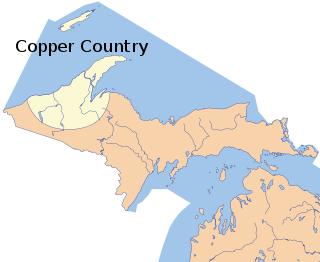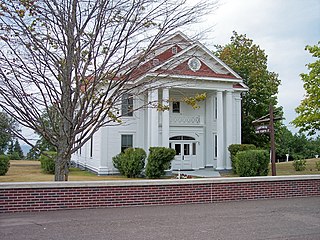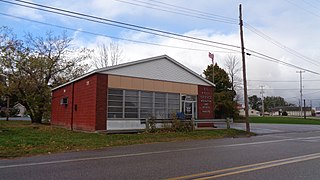Pryor's Location is situated on the Portage Lake Shipping Canal in Michigan, United States. Very little remains of this small settlement but a sign at the intersection of Lake Avenue and Lakeshore Drive in Houghton, Michigan, into which it has been incorporated. It is named after James Pryor, owner of Pryor Lumber and other businesses in the area.

The Keweenaw Waterway is a partly natural, partly artificial waterway which cuts across the Keweenaw Peninsula of Michigan; it separates Copper Island from the mainland. Parts of the waterway are variously known as the Keweenaw Waterway, Portage Canal, Portage Lake Canal, Portage River, Lily Pond, Torch Lake, and Portage Lake. The waterway connects to Lake Superior at its north and south entries, with sections known as Portage Lake and Torch Lake in between. The primary tributary to Portage Lake is the Sturgeon River.

Michigan is a state in the Great Lakes and Midwestern regions of the United States. The state's name, Michigan, originates from the Ojibwe word mishigamaa, meaning "large water" or "large lake". With a population of about 10 million, Michigan is the tenth most populous of the 50 United States, with the 11th most extensive total area, and is the largest state by total area east of the Mississippi River. Its capital is Lansing, and its largest city is Detroit. Metro Detroit is among the nation's most populous and largest metropolitan economies.

Houghton is a city in Houghton County in the U.S. state of Michigan. Located on the Keweenaw Peninsula, it is the largest city in the Copper Country region and the fifth largest city in the Upper Peninsula. As of the 2010 census, the city population was 7,708. It is the county seat of Houghton County.
Pryor Lumber was purchased by Albert W. Quandt and Edward A. Hamar in 1925 and renamed it the Hamar Quandt Company. The Hamar Quandt Company operated in this location until approximately 1985. The Hamar Quandt Company has been renamed 41 Lumber. The site of the lumber business is now the Houghton Super-8 Motel.
In the Copper Country of the Upper Peninsula of Michigan, a 'location' is a small settlement with few if any businesses. Locations were generally inhabited by miners, people with mining-related jobs such as running the smelters, and their families.

The Copper Country is an area in the Upper Peninsula of Michigan in the United States, including all of Keweenaw County, Michigan and most of Houghton, Baraga and Ontonagon counties as well as part of Marquette County. The area is so named as copper mining was prevalent there from 1845 until the late 1960s, with one mine continuing through 1995. In its heyday, the area was the world's greatest producer of copper.

The Upper Peninsula (UP), also known as Upper Michigan, is the northern of the two major peninsulas that make up the U.S. state of Michigan. The peninsula is bounded on the north by Lake Superior, on the east by the St. Marys River, and on the south by Lake Michigan, the Straits of Mackinac, and Lake Huron. Topographically, the base of the Upper Peninsula as a geologic feature lies in northeastern Wisconsin between the base of the Door Peninsula and Superior Bay; but in political geography, because most of the peninsula is within the boundaries of Michigan, it is measured eastward from the Porcupine Mountains, from the Wisconsin–Michigan boundary along and between the Montreal and Menominee rivers.

Mining is the extraction of valuable minerals or other geological materials from the Earth, usually from an ore body, lode, vein, seam, reef or placer deposit. These deposits form a mineralized package that is of economic interest to the miner.














